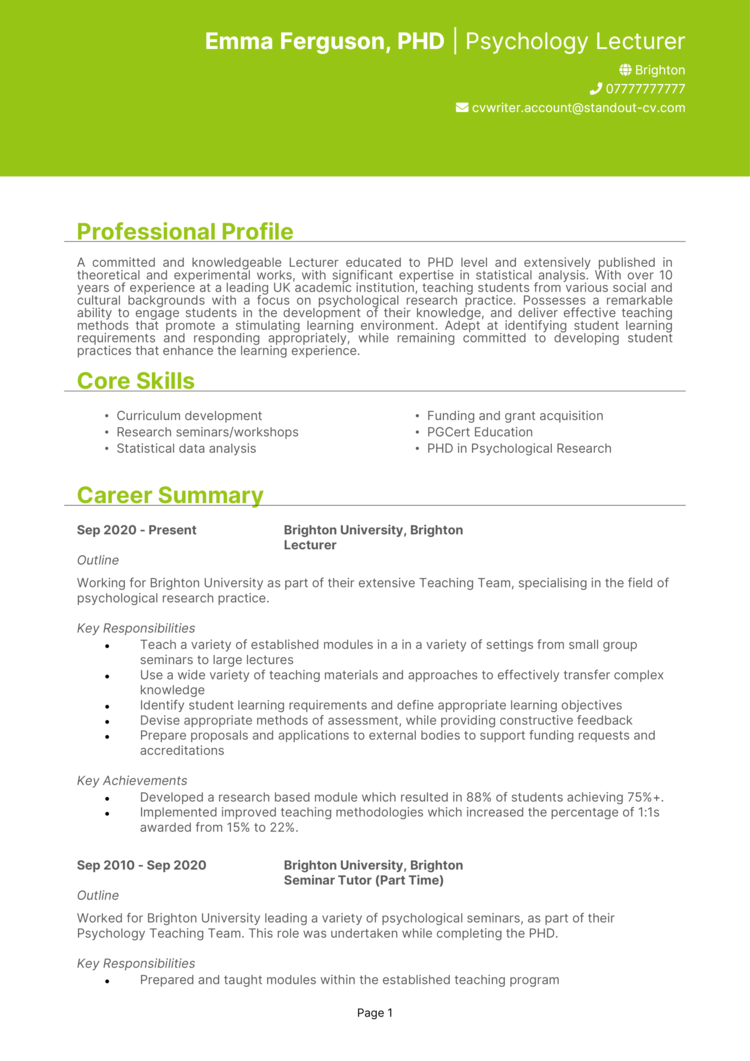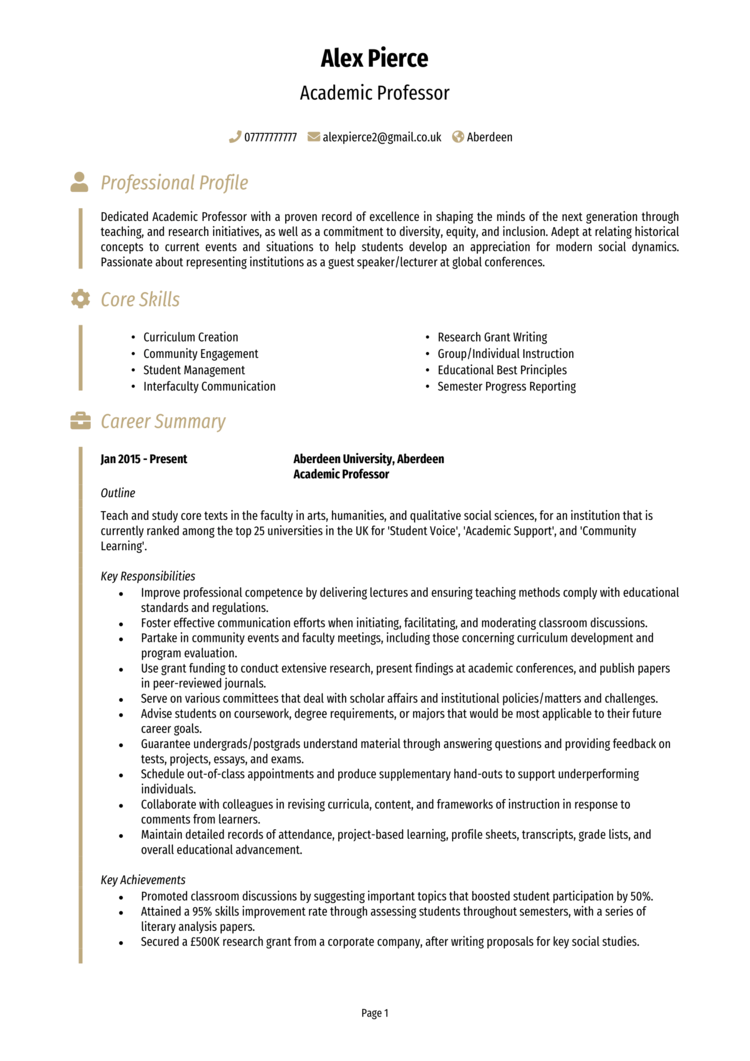Are you ready to lecture recruiters on why you’re the perfect hire? It’s time for your hardest assignment yet: crafting the perfect CV.
Your CV isn’t just a list of qualifications; it’s your academic portfolio in condensed form. This expert guide, with its research-backed insights and Academic CV examples, will give you an application that earns top marks and helps secure your next post.
Lecturer CV example

Researcher CV example

Academic Professor CV example

How to write your Academic CV
Learn how to create your own interview-winning Academic CV with this simple step-by-step guide.
This guide will walk you through every stage of writing an Academic CV with tips to properly highlights your research or teaching skills. From structuring it effectively to showcasing your academic and professional achievements, you’ll learn how to craft a CV that makes an impact in academia.
How to structure your Academic CV


Picture an Academic CV like a well-written dissertation. It’ll need to flow logically and show off the most pertinent facts clearly for the reader, condensing complex information in a digestible way. An academic recruiter or hiring committee should be able to immediately grasp your qualifications and achievements.
Ready to see how it’s done? Your CV should follow the below structure:
- Name and contact details – Place your contact details at the top for easy reference. A photo is optional.
- CV profile – Craft a short introduction that showcases your professional background and impressive academic achievements.
- Core skills – State your key academic strengths at a glance, tailored to the specific role you’re looking for.
- Work experience – Include any of your past roles, giving prominence to recent ones and academic jobs.
- Education – This section will be especially prominent, going into a great deal of detail about your qualifications, writings, and academic accolades.
- Publications – Include peer-reviewed articles, book chapters, and your other contributions to your field.
- Additional info – Optionally include any related and impressive extracurricular hobbies and interests that show your appreciation of the field.
Academic CV format


Think about it: your recruiter might have just finished reading a batch of shoddy undergraduate essays, so make sure your CV has a professional and polished layout that allows them to navigate your many enviable achievements easily.
To make sure your CV reflects the meticulous nature of academic work, follow these formatting principles:
- Bullet points – Use these to highlight key skills and achievements quickly and clearly.
- Divide sections – Break your CV into distinct sections with clear headings for smooth navigation.
- Use a clear font – A professional font and muted colour palette is especially appropriate for academic roles.
- No more than 4 pages – Most CVs are no more than 2, but academic employers expect to see more detail into your valuable contributions and experience.
Academic CV profile


And now we come to your CV’s abstract, so to speak. Your profile is going to introduce you to the hiring committee as soon as they open your CV.
Its focus depends on what academic role you’re applying for, but generally it should highlight things like your teaching expertise or research achievements, and above all else: your alignment with the institution’s values.
Academic CV profile examples
Profile 1
Dedicated Academic with over a decade of experience in higher education, specialising in molecular biology and genetics. Skilled in delivering engaging lectures, supervising postgraduate research, and publishing in high-impact journals. Experienced in securing research funding and collaborating on interdisciplinary projects.
Profile 2
Organised Academic with five years of experience as a lecturer in environmental sciences, focusing on sustainable development and climate change. Adept at curriculum development, delivering online and in-person lectures, and mentoring undergraduate students. Published author in peer-reviewed journals and skilled in grant writing.
Profile 3
Proficient Academic with eight years in social sciences research, specialising in sociology and public policy. Expertise in leading international research collaborations, presenting at global conferences, and producing publications that influence policy decisions. Skilled in qualitative and quantitative research methods and academic writing.
What to include in your Academic CV profile
Tailor your profile to the specific position by referencing the specific qualities listed in the job description. It should aim to include the following:
- Where you’ve worked – Summarise the types of the universities and research institutions where you’ve been employed.
- Your top qualifications – Highlight your most impressive academic qualifications and fellowships.
- Essential skills – This really depends on the role, but try to focus on key areas like curriculum design, grant writing, or supervising postgraduate students.
- Research focus areas – State the specific areas of study you’ve worked extensively on.
- Courses you’ve taught – Name the relevant modules and subjects of things you’ve taught in the past.
- People you’ve worked with – Reference collaboration with students, research teams, other academic colleagues, or interdisciplinary groups.
- Relevant tools you know – Include any specialised tools and methodologies used in your particular field of research.
Core skills section


The core skills section is your opportunity to highlight the abilities that are going to set you apart as an academic professional.
Generic soft skills are like unsourced citations: they just won’t cut it. And you know how much academics love specialist language, so highlight concrete examples like “developing innovative pedagogical approaches” or “leading grant-funded research projects.”
For roles like lecturer or researcher, this bit might include curriculum research methodologies and administrative skills. Tailor the skills to the institution’s needs: emphasise things like student engagement if it’s a teaching role you want, or data analysis for research-heavy positions.
Struggling to put together your academic CV?
Try our CV builder – it helps you present your research, publications, and achievements clearly with tailored templates and expert tips.
Most valuable skills for your Academic CV
- Curriculum Development – Designing and implementing course syllabi aligned with institutional and disciplinary goals.
- Research Methodologies – Applying advanced qualitative or quantitative methods to address complex academic questions.
- Grant Writing – Securing funding through competitive grant applications from institutions like the ESRC or AHRC.
- Student Mentorship – Supervising undergraduate and postgraduate dissertations, ensuring academic and professional growth.
- Peer-reviewed Publications – Authoring impactful articles in top-tier academic journals.
- Conference Presentations – Delivering engaging talks at national and international academic conferences.
- Data Analysis Tools – Proficiency in software such as SPSS, NVivo, or MATLAB for research purposes.
- Interdisciplinary Collaboration – Working across departments to produce innovative, cross-disciplinary research.
- Educational Technology – Incorporating digital platforms like Moodle or Blackboard to enhance teaching and learning experiences.
- Outreach and Public Engagement – Developing initiatives to communicate research findings to wider audiences.
Work experience


The work experience section will show off your impressive litany of academic and professional positions. Hiring committees want to see the actual tangible impact in your teaching, research, and administrative roles, and how you’ll bring that value to their institution.
List your roles in reverse chronological order, focusing on the responsibilities that align with the position you’re applying for. Use bullet points to highlight these key bits.
How should you list jobs on your Academic CV?

- Outline – Provide an overview of the institution, your role and how it fits within the wider organisation, and the primary focus of your post.
- Responsibilities – Detail your main duties, whether it involves teaching and researching or administrative tasks.
- Achievements – Numbers look really good here: a recruiter wants measurable outcomes, such as improved student feedback scores, the size of conferences you’ve spoken at, or the number of citations your published research has received.
Example jobs for Academic
Lecturer | UCL
Outline
Served as a Senior Lecturer in molecular biology, teaching undergraduate and postgraduate courses while leading research in gene therapy. Supervised student projects and contributed to academic committees.
Responsibilities
- Developed and delivered engaging lectures and lab sessions for BSc and MSc students.
- Supervised PhD candidates, guiding research projects and ensuring timely completion.
- Published research findings in high-impact journals and presented at international conferences.
- Secured research funding through grant applications to national and international bodies.
- Contributed to curriculum development and participated in academic quality assurance processes.
Achievements
- Published 10+ papers in journals with an average impact factor of 8.0.
- Secured £500,000 in research grants, funding cutting-edge gene therapy studies.
- Supervised three PhD students to successful completion within their funding periods.
Assistant Professor | Imperial College London
Outline
Worked as an Assistant Professor in environmental sciences, focusing on teaching and research related to sustainable development. Actively participated in department initiatives and student mentorship.
Responsibilities
- Designed and delivered courses on climate change, renewable energy, and sustainability.
- Organised field trips and experiential learning opportunities to enhance student understanding.
- Published research on renewable energy adoption and its socio-economic impact.
- Advised undergraduate dissertation projects, fostering research skills in students.
- Served on the department’s outreach committee to promote environmental awareness.
Achievements
- Published four peer-reviewed articles in environmental journals, reaching 500+ citations collectively.
- Improved student satisfaction scores by 20% through interactive teaching methods.
- Secured £100,000 in funding for community-based sustainability research projects.
Researcher | Birmingham University
Outline
Served as a Research Fellow in sociology, leading projects that explored the impact of public policy on social inequality. Focused on producing influential publications and building collaborations.
Responsibilities
- Conducted qualitative and quantitative research on public policy and social mobility.
- Co-authored research papers and submitted findings to top-tier journals.
- Presented research at international conferences, engaging with global academic communities.
- Collaborated with policymakers to translate research into actionable strategies.
- Mentored junior researchers and provided workshops on research methodologies.
Achievements
- Published five papers in sociology journals, with one receiving an award for policy impact.
- Organised a symposium on social inequality, attracting 200+ participants.
- Received £250,000 in funding for a multi-institutional research project.
Highlighting your Education


As you’d expect, academics are a fair bit more interested in your education than most other roles, so you should definitely focus on fleshing out your academic history too.
To give key insight into your academic journey with maximum impact, include things like:
- Degrees earned – List your undergraduate, postgraduate, and doctoral qualifications, along with the awarding institutions and dates.
- Thesis or dissertation – Briefly describe the topic of your thesis, particularly for postgraduate studies.
- Academic accolades – Highlight scholarships, distinctions, or fellowships that demonstrate your excellence.
Just like your work experience, list them in reverse chronological order, so the recruiter sees your most recent and relevant achievements first.
Key qualifications for Academics
- Doctor of Philosophy (PhD)
- Master of Philosophy (MPhil)
- Masters and undergraduate degrees
- Postgraduate Certificate in Higher Education (PGCHE)
- Fellowship of the Higher Education Academy (FHEA)
Additional info
As an academic, proof of your expertise extends beyond your work experience and qualifications. Add some more detail into your scholarly contributions, such as:
- Conference presentations
- Peer-reviewed articles
- Books or book chapters you’ve authored.
- Ongoing research projects or upcoming publications.





